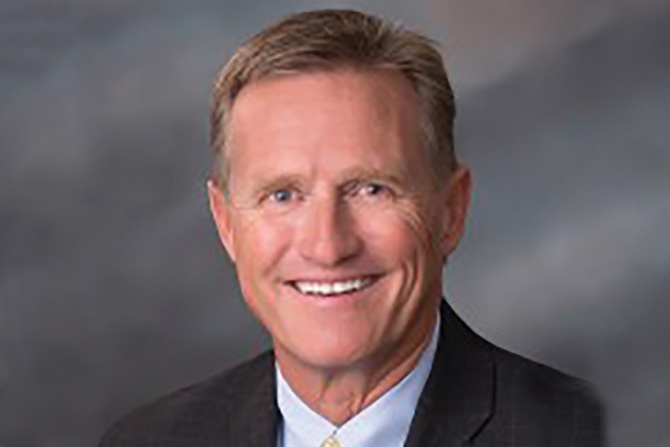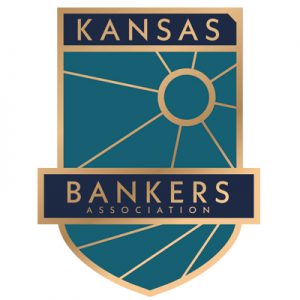How is your last name pronounced?
AV. My ancestry has been traced back to Austria. The pronunciation of my last name has been a good conversational topic my entire life.
Tell us about your family.
I am so lucky that my wife, Leslie, settled for me. I’m the son of a teacher, and I married a teacher. Leslie has taught since graduating from Oklahoma State. She left the classroom seven years ago and is currently the coordinator for Parents as Teachers. I must give my wife most of the parenting credit. Luckily, the kids didn’t pay that much attention to me.
Our daughter, Kirsten, will be 26 in August. She works for Ignite Medical Resort in the Kansas City area.
Our son, Christopher, is 23 and a recent graduate from Kansas State University with a business degree. He just began his career with RTS Financial in Overland Park.
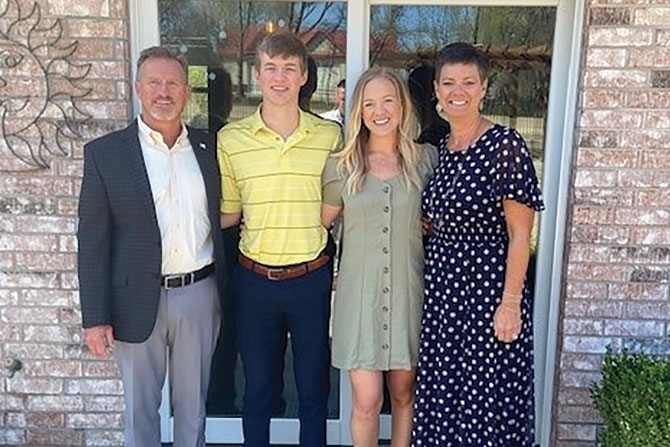
How did you become a banker? Did you always aspire to be part of the financial industry?
I did. I became interested in banking because of my dad’s friend, Lendell Bass. Lendell was the president of Hanston State Bank during my high school years. I thought what he did was pretty cool. When a sponsor was needed, Lendell was always there, representing Hanston State Bank. Lendell recommended that mom and dad mortgage some farm ground to buy stock in the Hanston State Bank. It turns out that was a pretty good recommendation.
At a high school graduation party, Lendell asked if I would like to work at the bank as a teller over the summer. I thought that sounded like more fun than driving the tractor in circles, and my dad said OK because he knew it would save him equipment repair bills. When I went to college that fall, I went with a community banking career in mind.
Describe your educational background. What did you study?
I grew up on a farm in a small town of about 200 people. There were 14 students in my graduating class and maybe 75 students total in the high school. I attended Barton County Community College and then transferred to Kansas State University.
One of the classes I took for my first-semester finance degree at Kansas State University was a macroeconomics class called Money and Banking. I had enrolled late (that’s another story for another day), so I bombed my first test and ended up making a D in the class. Maybe I should have dropped the class, but money was tight, and I did not want to waste any. I now wear that D as a symbol of a rite of passage, and, hopefully, I won’t be evicted as the chair of the KBA once this story gets out.
I like numbers, and I love budgeting. I still have the spiral notebook with my first budget, which I used in 1980 when I was at Kansas State. My son is into budgeting, and he likes discussing the finer points of budgeting with me. My daughter, not so much.
In 1995, I graduated from the Southwestern Graduate School of Banking at Southern Methodist University in Dallas.
Are there any specific individuals who had a major impact on your career, and how?
I have already told you about Lendell, but my dad was a big influence on my banking career, too. My dad was a quiet guy, but I didn’t realize until I had been working for 10 years or so how much he had taught me about banking while making me fix fences. I told a story at my rehearsal dinner about how my brother and I were supposed to be walking the hedge post fence line to make sure all the posts were solid. It was a hot day, so we decided to drive along with the AC going and just look at the fence. We missed some broken posts that were held up straight by the barbed wire, and dad let us know he was not happy. Later, my best man made me a gift that had a fence on it. Three posts were all straight, but the middle one was broken off. Attached was a quote that read, “never be deceived by what you see from a distance,” and was signed Ralph Ewy. My dad passed away, way too young, in 2004.
Studies show that our brains are 80% developed by age three. My parents deserve the credit for any success I have, and the jury is still out on whether the other 20% of my brain will ever develop.
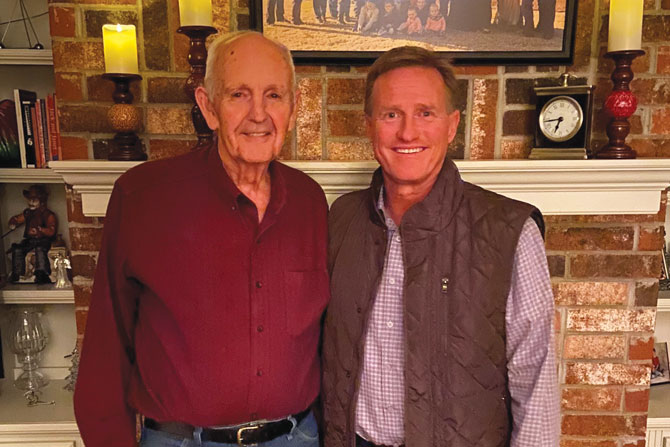
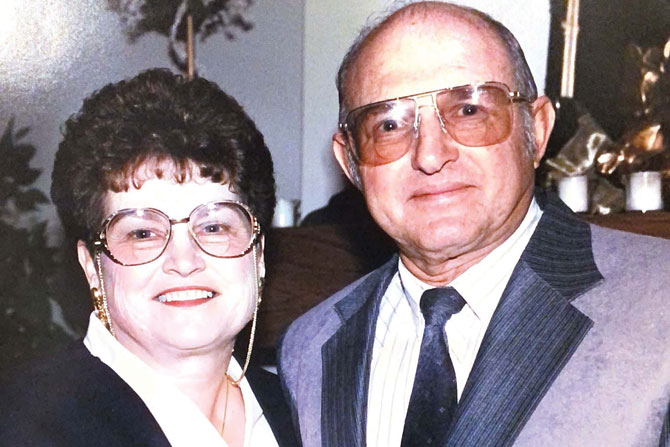
What is the most rewarding part of your career?
Helping my community and customers. My definition of a community bank is a small bank in a small community. Community banking allows you to get involved in a significant way to help your community. I learned early in my career being involved was fun, so I decided to stay with it.
One of my longtime friends and I talked about how cool it would be if we owned a bank together someday and have the bank name on the high school football field scoreboard. We both grew up in small towns and knew the importance of having a local bank. After the acquisition of Community State Bank, I sent him a picture of the local scoreboard. To us, the scoreboard picture is a symbol of what it means to be a community bank.
For the last 30 years, my avocation has been trying to help create housing in the communities where I have lived. All three communities I have lived in during that time all struggled with the availability of housing infrastructure. In Coffeyville, we have our share of jobs with good people coming and going from those jobs, but new houses are desperately needed. In 2004 while I was chair of the area Chamber, we successfully facilitated the building of 14 new homes. Currently, I am involved in another project underway with two homes under construction.
How has retail banking changed in the last five years?
I learned early how banking commercial customers was a good way to generate revenue. Digital banking services are very expensive. We provide them, but I am not sure I have figured out how to make money with them.
Retail banking was not something I focused on until arriving in Coffeyville, but customers now want to pay bills online and use their phones to deposit checks. As a bank, I never wanted us to be on the bleeding edge of technology, but I also did not want us to be left behind. Our bank now offers pretty much all of the bells and whistles of digital banking.
My whole career, I’ve struggled with whether I am a micromanager. What I hope I am is a hands-on manager. I try to lead my team by attempting to live what I am asking my team to do. That usually means going the extra mile to do the right thing.
What ideas would you like to share about the future of the financial industry and any leadership books you have enjoyed?
I should admit I have never had an original idea. I have borrowed just about every idea I have used.
One of the things I try to be is a sponge. When I hear a banker who seems to know what they are talking about, I check their call report numbers to find out if they really do, and then I absorb everything I can from the good ones.
With a higher-than-normal case of ADD, I struggle with sitting down to read, but I like to listen to audiobooks while driving. I recommend:
- Seven Habits of Highly Effective People by Stephen Covey
- The 4 Disciplines of Execution by Chris McChesney
- Books by John Maxwell
I have tried to listen to a lot of books about leadership. I only had one class at K-State about management, but I stumbled into a management position at age 27. At 61, I am still trying to learn how to be a better manager.
What have been some of the major challenges in creating a balance in customer branch and digital-based transactions?
My elevator speech about our bank is we offer the best of both worlds when it comes to balancing technology and customer service. Some of our customers do as much banking as possible digitally, and others still come into the bank every day to get their cash to buy a round of coffee for their friends.
I am proud of our community banks and the services we offer. Most of us have all the bells and whistles, but we still have someone to answer the phone if you call the bank.
What is the secret to creating a culture within a banking organization where customer satisfaction is the focal point?
Ken Blanchard and a couple of others wrote a book called Leadership by the Book that is based on the teachings of Jesus Christ. It had one of the best definitions I have heard about servant leadership. Jesus was a servant leader. I have also been lucky to be a Rotary member, and our motto is Service Above Self.
My whole career, I’ve struggled with whether I am a micromanager. What I hope I am is a hands-on manager. I try to lead my team by attempting to live what I am asking my team to do. That usually means going the extra mile to do the right thing.
What is the biggest impact of being a KBA member? What makes it beneficial?
I moved back to Kansas and became a KBA member in 2000. Since then, we have utilized the health insurance plan, fidelity bonds and D&O insurance. The legislative arm is also valuable. A lot of things go on behind the curtain that one typically doesn’t get to see unless they are going through the officer chairs.
Are you involved in any civic or charitable organizations?
One of the best and worst things I do is get too involved. Like most community bankers, I would guess there might only be a couple of organizations in town that I haven’t been active with.
If you look back at your career and life, what would be three things that you have learned and would pass onto a younger person within the banking industry?
- Be a sponge and never stop learning. When I was about to graduate from the Southwestern Graduate School of Banking, I had an instructor who challenged us to continue pursuing additional education. He suggested the Certified Financial Planning program, so I did that.
- Don’t take yourself seriously. Stay humble and stay teachable. Sometimes you will be thrust into positions you have not been trained for, and you will have to do the best you can.
- Pay it forward. However, sometimes you won’t realize the influence you have in a specific moment. For example, there was a young girl years ago who worked in the loan department I managed. I got a graduation announcement from her years after I left that bank. In the announcement, she wrote, “I wanted you to see this as you’re the reason I finished college.” I don’t remember the specific conversation when she felt encouraged to push through for her degree.
What are some professional moments that make you the proudest?
I started my career with the federal land bank. 1982 wasn’t the best year in the history of our Midwest economy, so I was very lucky to get one of only the six jobs offered for the four-state area it served. I received great credit analysis training, and after about five years, I went looking for a banking job and had to move to Oklahoma to find it. I worked for 13 years in Oklahoma before finding my way back across the state line, albeit just barely.
When I got to Coffeyville in 2000, there were no locally owned banks. People perceived one of the banks as being local, but it had actually been owned out of state since the 1970s.
After a little less than three years, I was lucky enough to put together a group of investors and acquired Community State Bank. I am proud to say our bank has been locally owned now for almost 20 years. The Coffeyville community deserved having a local bank, and I appreciate how they responded to it.
Was there an “aha” moment in your career that defined you?
I guess I’m still being defined, but as I mentioned earlier, owning a community bank has always been one of my goals ever since meeting Lendell Bass and seeing his business relationship with my dad. I was able to buy five shares of the Hanston State Bank in 1987 and remain a shareholder in that holding company.
Thanks to reading the Seven Habits of Highly Effective People, I have had a family mission statement that has helped balance the way I look at my life.
Some of the previous KBA chairs and presidents are my acquaintances and friends. I appreciate everyone who has served before me, and I am doing this to honor their service to Kansas banks. I hope I am able to serve Kansas bankers well.
What is your favorite way to spend your free time? Any unusual hobbies?
Golf is probably my No. 1 hobby, and I am trying to play 300 different courses. I have about 260 on my list so far. I also enjoy an occasional Harley ride with my biker friends.
I’m not sure if this qualifies as an unusual hobby, but I know it drives my wife and my biker friends crazy when they have to stop for me to buy a bumper sticker to add to my collection. I mean, who does not have a KSU Powercat or a Grab a Cup of Coffeyville sticker on their garage fridge, right?



